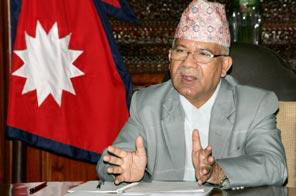Equidistant with India, China: PM
KATHMANDU: Prime Minister Madhav Kumar Nepal today said that the country wants to maintain equidistant relationship with its two neighbours -- India and China.
Addressing a conference on "Nepal's National Interest: Policies and Recommendations", jointly organised by the Centre for South Asian Studies and the Konrad Adenauer Foundation, the PM said the relationship with the two countries had been a traditional one and based on mutual cooperation.
"Traditionally and historically, we've been consistently following a policy of having good relationship and ties of mutual cooperation with both India and China as a matter of priority," he said, adding that this was the only viable way for a country of
such strategic location, irrespective of any government in power.
"We don't have any desire to play any card or use relationship with one against the other," the PM clarified. He further added that Nepal was sensitive at the concerns of Nepal's friends. "We have consistently emphasised on our policy of not allowing our territory against the interest of any country.
It is in this context that we also seek to be assured of similar sentiments of support and co-operation from friendly countries in our bid for promoting our national interest," the PM noted.
"Our supreme interest lies in building bridges of friendship and co-operation and interlink our economic, technical, trade and investment relations with our two great neighbours that have emerged as the economic power houses in recent years," the PM said.
According to the PM, the country wanted to take advantage of the tremendous scale of economic and technical development in these two countries, promote greater connectivity, and enhance our endeavours for rapid socio-economic transformation.
"I paid a successful official visit to India some time ago with the objective of further consolidating our multi-dimensional relationship.
I'm also planning to visit China at a mutually convenient time with the same objective," he said.
The PM also urged the political parties to build consensus for the country's national interests.
"We have to give the topmost priority to safeguarding sovereignty, national unity and territorial integrity. It's very essential on the part of political forces in the country to have a consensus on utilising our natural endowments like water resources."
According to the PM, the government preferred to pursue a policy of national consensus on vital matters of national interest like optimum exploitation of water resources, ensuring an effective system of food supply, reversing negative impact of climate change, protection of the unique Himalayan ecosystem with exotic flora and fauna.
The government has accorded top priority to three immediate objectives - positive and meaningful conclusion of the peace process, drafting a new constitution and accelerating social and economic transformation of the country through increased and effective mobilisation of both internal and external resources.






